October 13, 2025. Jeongil-sa Opening Ceremony, Leading Members’ Dharma Assembly, Gilbeot Dharma Assembly
Hello. Today is the day for the Dharma assembly for Jungto Society’s leading members and a special lecture by Venerable Pomnyun Sunim hosted by ‘Gilbeot,’ a gathering of broadcasting, film, theater, and arts professionals.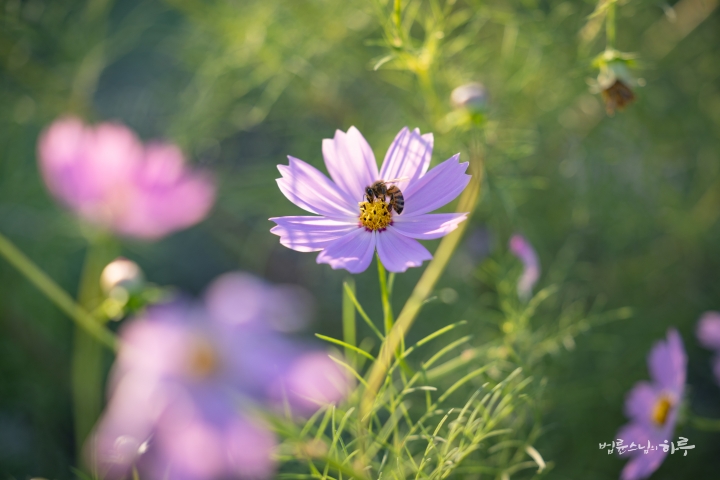
After completing morning practice and meditation, Sunim headed to the Jungto Social and Cultural Center. At 7:30 A.M., former Congressman Kim Doo-kwan visited for a breakfast meeting. After the meal, they spent an hour discussing the role politics should play in national unity and ways to improve inter-Korean and US-North Korea relations.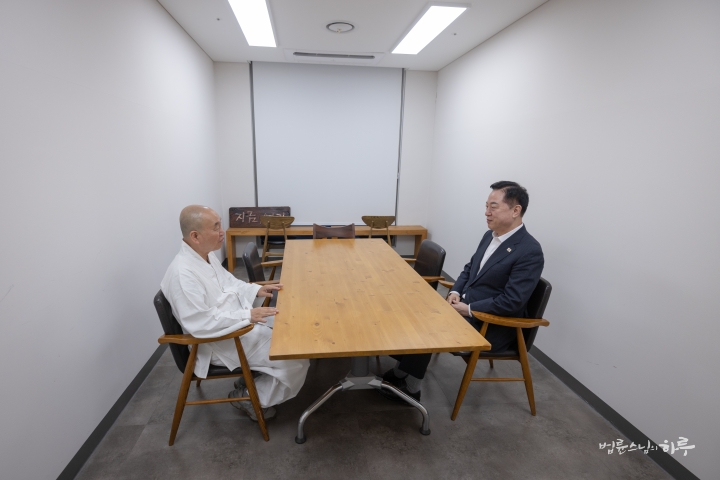
After the meeting, Sunim moved to the broadcasting room at Jungto Center at 10 A.M. for a live broadcast of the leading members’ Dharma assembly. Today’s assembly was combined with the opening ceremony of Jeongil-sa, a training program for Lay Member Group volunteers.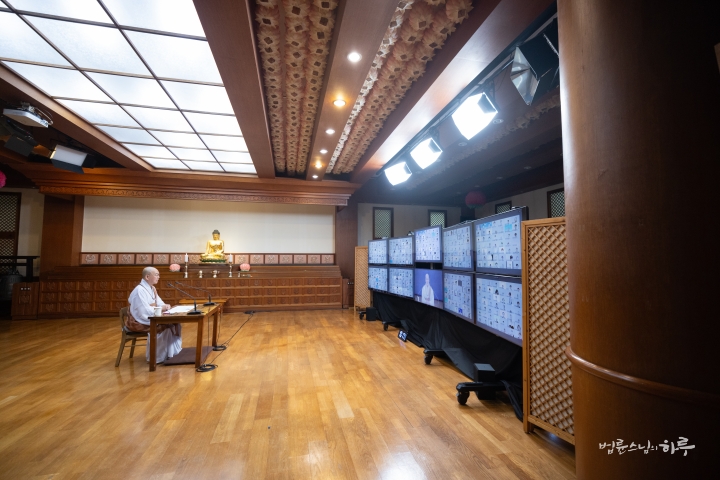
First, the Dharma Teacher group presented about the Jeongil-sa (Builders of Jungto) training program, followed by Sunim’s opening Dharma talk on the proper mindset for participating in Jeongil-sa training.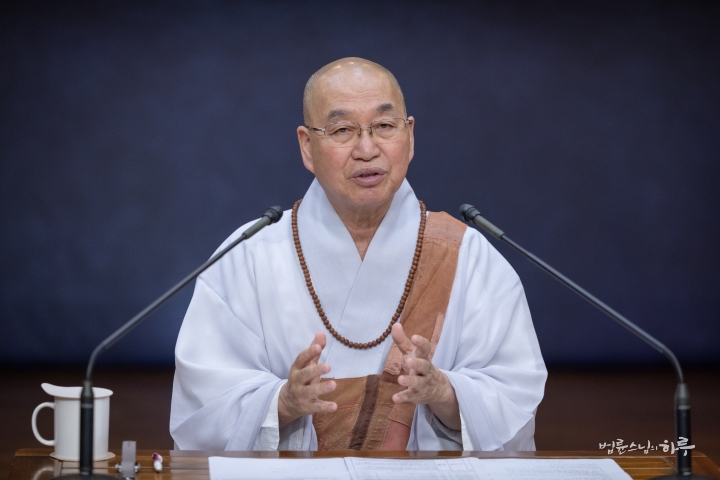
“The autumn rain is falling gently. Normally, autumn should have clear weather for harvesting, but this continuous rain seems to be causing considerable difficulties for farming. On the other hand, the heat that continued throughout summer extended into September, but with this rain, the weather has become noticeably cooler.
The Path to Maintaining Peace of Mind in a Chaotic World
While the world is in turmoil and domestic politics are unstable, blaming external circumstances won’t bring peace to our lives. The essence of practice is to be aware of our minds and maintain equanimity even amid such chaos. Conflicts arise in marital relationships, difficulties emerge in raising children, stress occurs at work, and various issues arise from health problems to social unrest and climate crisis. However, if we blame each of these things one by one, it becomes difficult to spend even a single day peacefully. Maintaining peace of mind in such a world – that is the path of a practitioner. Keeping peace of mind is solely my responsibility and my issue. This attitude of taking responsibility for one’s own mind is precisely the perspective of practice. 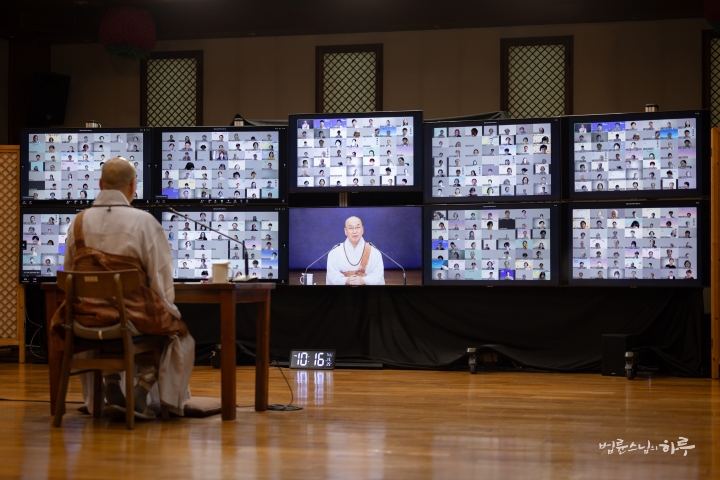
Simultaneously, people in the world are experiencing many difficulties in this chaotic society and complex human relationships. The more this is the case, the more we should become people who can help them even a little. We should share food with those who cannot afford meals due to economic hardship, provide medicine to those who are sick but have no medication, and help build schools if children cannot attend school. Becoming a refuge for those who have nowhere to turn and instilling hope in those who have lost it – this is the path of a practitioner.
A practitioner must look inward to maintain peace of mind while looking outward to understand and comfort those who suffer. Taking care of one’s own mind and maintaining equanimity is called ‘wisdom,’ while understanding and helping others’ suffering is called ‘compassion.’ Those who practice both wisdom and compassion together are called ‘bodhisattvas.’ A bodhisattva is someone who lives such a life not apart from the world but right within it.
Saying things like “my husband is this way,” “my wife is that way,” “my children are like this,” or complaining about parents, workplace, or supervisors, and blaming others for one’s suffering is ultimately just rationalizing that suffering. The more difficult the situation, the more clearly we must practice with the awareness that ‘this is my issue.’ Only when we can maintain peace of mind in any situation can we say we have ‘gained the power of diligent practice.’ 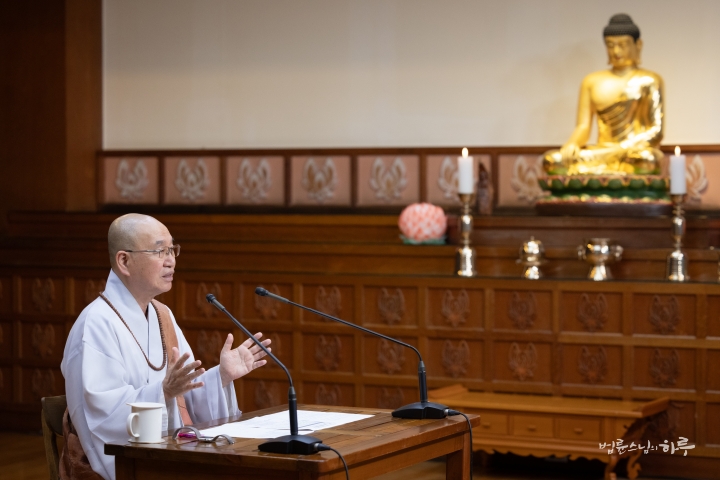
Simply feeling that Buddhism is good because I explain the Buddha’s teachings in an easy way, or living comfortably because you’ve met a good spouse or parents, cannot be called practice. This is because anyone can live peacefully when external conditions are favorable. True practice lies in maintaining peace of mind by overcoming adverse conditions on your own without being swayed by their influence, especially when the environment is unfavorable.
In the past, living conditions were harsh, and people naturally developed the strength to overcome hardships through firsthand experience. However, nowadays, with improved educational and economic environments and significantly reduced social discrimination, people lack experience in overcoming adversity. As a result, despite the Buddha’s teachings being conveyed much more easily than before, many people easily collapse and become discouraged when things don’t go their way even slightly, or when they face economic difficulties or conflicts in relationships.
Additionally, while the transition to online platforms has the advantage of spreading the Dharma quickly and widely, the lack of direct experience in overcoming difficulties has led to many people giving up or quitting easily. Consequently, while more people are coming to Jungto Society, there has also been an increase in those who study Buddhism briefly and then leave quickly. Improving systems and making Dharma talks more accessible is certainly desirable. However, if we focus solely on improving external conditions rather than concentrating on cultivating our own minds, the spirit of practice may gradually weaken, and the culture of practice may come to resemble secular perspectives. 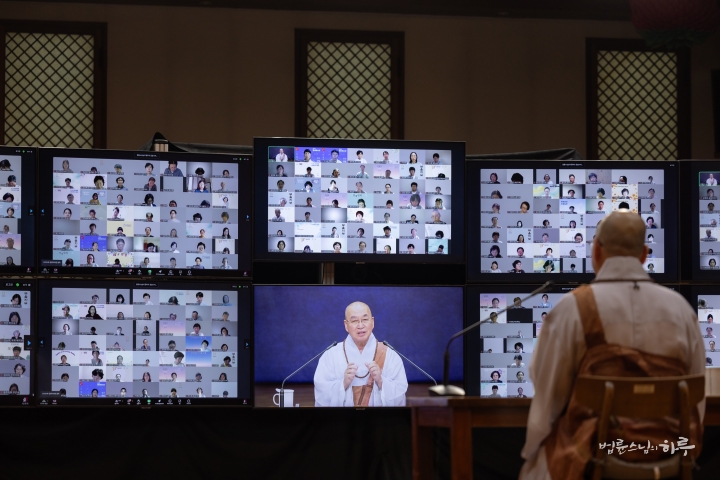
That’s why Jungto Society holds the ‘Semi-annual Retreat for Jungto Practitioners’ twice a year, in June and October. This is designed to help practitioners gain experience in overcoming difficulties on their own in daily life. While it would be wonderful if we could gather at the Dharma center to practice and share together as we did in the past, we now live in an era that has transitioned online. Therefore, with the mindset that ‘my home is my Dharma center,’ we can connect online and continue our individual practice steadily, whether others are watching or not.
Starting today, we will practice 300 prostrations daily. Of course, doing 300 prostrations will be physically demanding, and thoughts of not wanting to continue will arise. If we simply follow those thoughts, we will eventually stop our practice. That’s precisely when overcoming and conquering that reluctance becomes the core of our practice. With work obligations, childcare, household duties, Jungto Society activities, and Dharma School studies, finding time for prostrations will be absolutely challenging. Adding 300 daily prostrations to an already busy schedule is certainly not easy. Nevertheless, the reason we have these practice periods is to experience overcoming that weight by deliberately taking on additional burdens. It’s like practicing high jump with sandbags tied to your legs. After training that way, when you remove the sandbags, you feel much lighter and freer. Similarly, during this practice period, we add 300 daily prostrations while maintaining all our existing responsibilities.
Feelings of reluctance, afflictions, and dissatisfaction will constantly arise as we continue our practice. At those moments, we might become overwhelmed by these afflictions and give up. However, if we overcome and conquer those moments, our minds become refreshed and we gain confidence. The Semi-annual Retreat for Jungto Practitioners is about gathering with fellow practitioners to share our hearts and confirm the joy of practice based on these experiences.
When working together, we sometimes look at others and think, ‘They’re such a wonderful person, but if they could just change this one thing, they’d be even better.’ At home, we might feel the same about our spouse: ‘My husband is great in every way, but if only he could fix this one thing.’ However, expressing such thoughts directly in daily life can easily become seeds of conflict. That’s why during the Semi-annual Retreat, we share these thoughts in the form of ‘gifts.’ With the mindset of ‘If you improve this one aspect, your character will shine even brighter,’ we exchange gifts that support each other’s practice. This isn’t about criticizing or raising issues because someone’s behavior made us uncomfortable, but rather offering suggestions with respect and affection, saying ‘I think it would be even better if you did this.’ Practicing with these gifts we’ve given each other will greatly benefit our future lives. As the saying goes, ‘It’s darkest under the lamp’ – we often don’t know ourselves well. So let’s borrow the bright eyes of our fellow practitioners to become aware of our shortcomings and work on improving them. 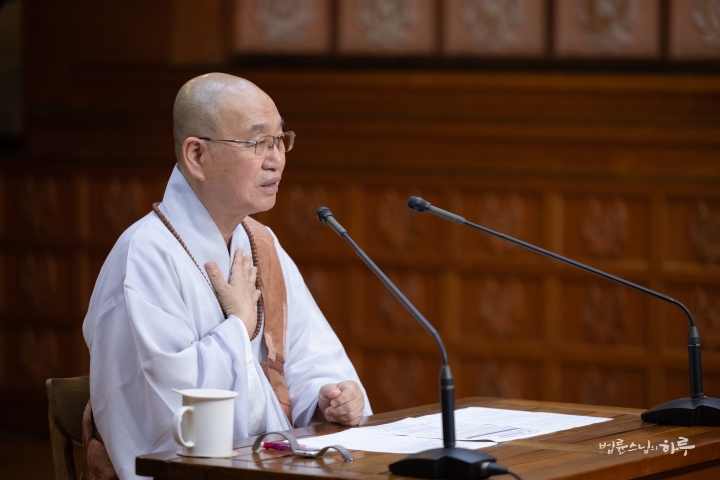
This year is particularly significant as it marks the final year of the three-year 1000-Day Practice. As leading members, you are conducting Jungto Dharma School, Jungto Sutra Course, and Happiness School, or serving in various roles such as Group Facilitator, branch leader, division leader, team leader, director, coordinator, and co-facilitator, leading the work of Jungto Society. I am well aware that all of you are facing many challenges. It is not easy for anyone to volunteer for others while also being responsible for their own livelihood. However, it is precisely through willingly undertaking these difficult tasks that the strength of a bodhisattva grows.
A bodhisattva is someone who possesses the power of vow (願力), a great aspiration. The greater the power of vow becomes, the greater the strength that emerges. This semi-annual retreat is a practice designed to cultivate that bodhisattva’s power of vow. Therefore, I hope all fellow practitioners across the country will participate in this semi-annual retreat together. From today, the first day of the semi-annual retreat, I hope you will continue your practice with such aspirational determination.”
Although this is a time when various events make us increasingly busy, Sunim concluded the opening Dharma talk for the semi-annual retreat by emphasizing that practice should be our top priority above all else. Following this, anyone could press the hand-raising button to ask questions about difficulties they face in their activities. After an hour of dialogue, the live broadcast ended at 11:30 A.M. 
After lunch, Sunim worked on administrative tasks indoors in the afternoon. While working, he headed back to The Peace Foundation to meet with guests.
At 4 P.M., President Yoon Jae-woong of Dongguk University and Secretary-General Park Ki-ryeon of the Founding Committee visited Sunim. The president requested that Sunim come to Dongguk University to give good lectures for the students. While expressing gratitude for the offer, Sunim politely declined. Instead, he promised to hold Dharma Q&A sessions twice a year for Dongguk University students and faculty. After the meeting, they visited the Dharma Hall on the 3rd floor and the rooftop temple on the 15th floor together and took commemorative photos.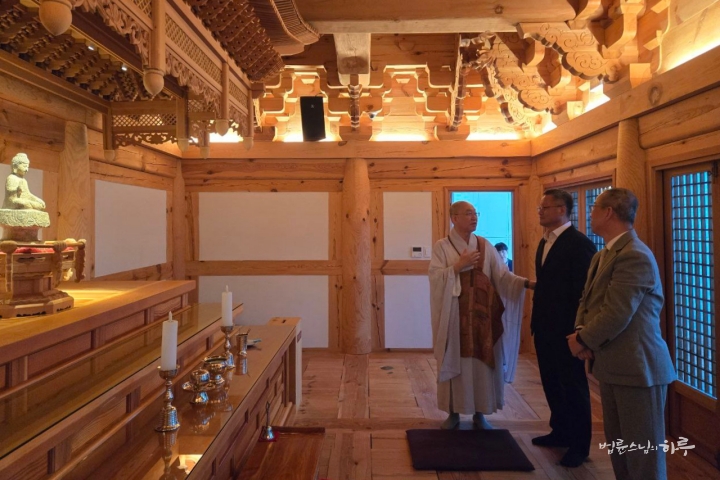
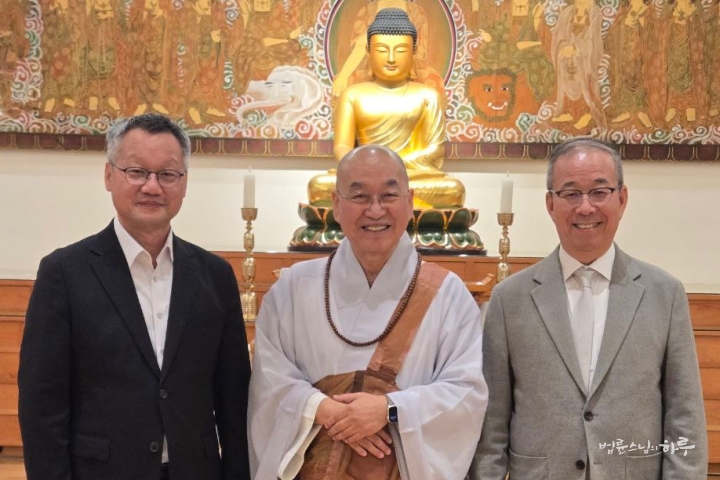
Today was the day for a lecture by Venerable Pomnyun Sunim hosted by ‘Gilbeot,’ a gathering of broadcasting, film, theater, and arts professionals. As the sun set, people active in broadcasting and the arts began arriving one after another.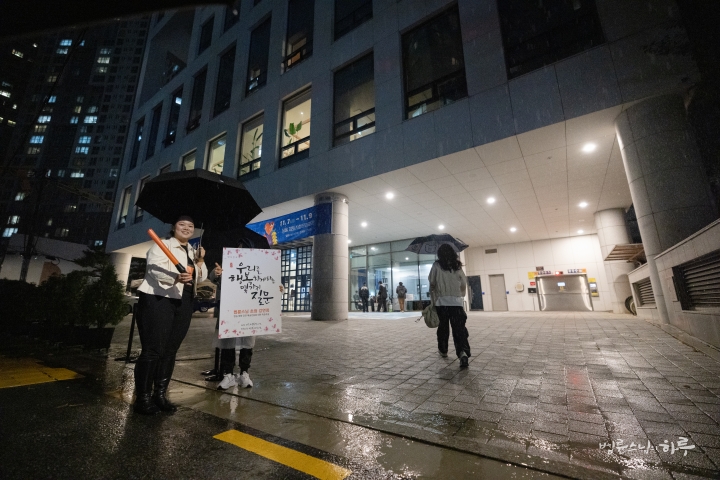
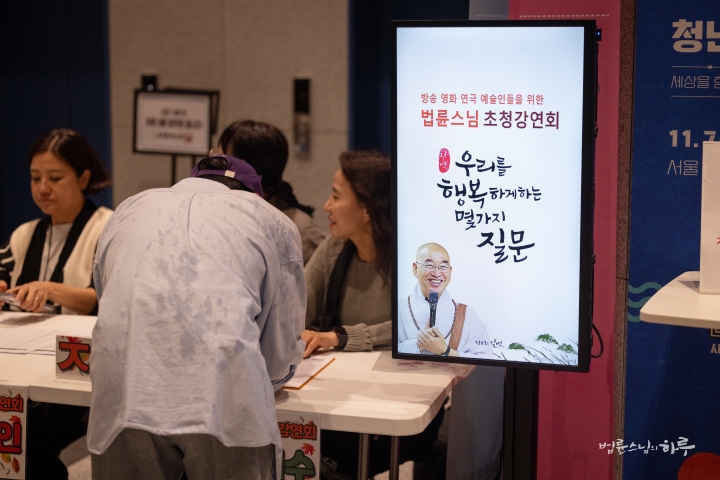
Before the lecture, they shared tea and conversation at the lounge on the 2nd floor starting at 6:20 p.m. Many famous actors frequently seen in movies and dramas were also present.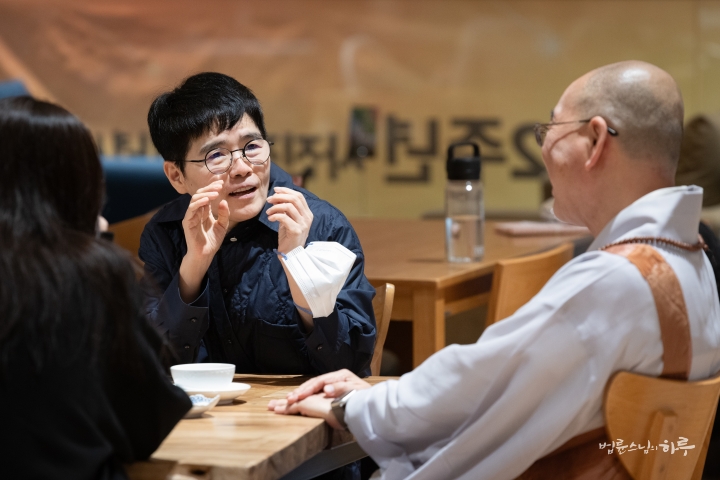
As they conversed, it was soon time to begin the lecture. After taking commemorative photos with the actors, Sunim moved to the underground auditorium.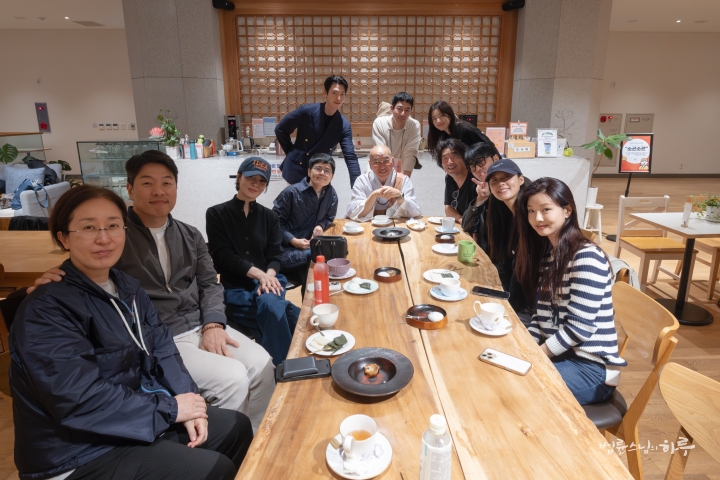
With about 240 people filling the seats, actress Im Se-mi, who served as the host, introduced the purpose of today’s lecture.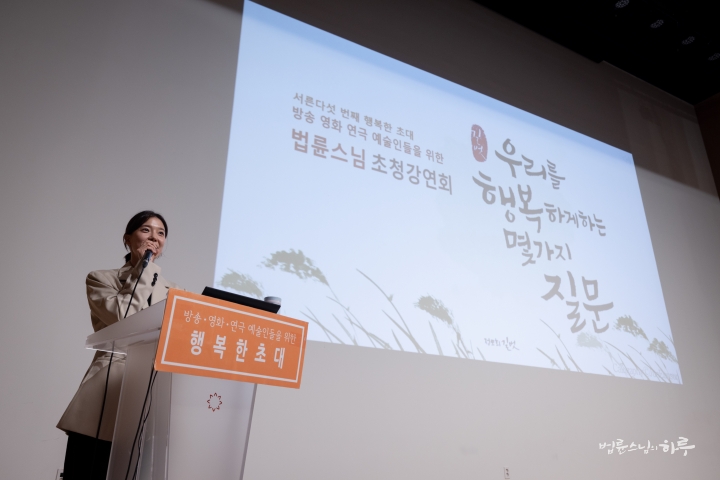
“This year, many things have happened at Gilbeot. There have been many painful and difficult times. Some had themselves or their children fall ill, some had parents with serious illnesses, and several said their final goodbyes to their parents. In each of these moments, what Gilbeot members commonly said was, ‘I don’t know how fortunate it is that we are studying together to examine our minds.’ So today, we want to look at that mind a little more closely. I hope we can find a path together in Venerable Pomnyun Sunim’s words on how to look at our minds and be happy even when life is difficult and painful.”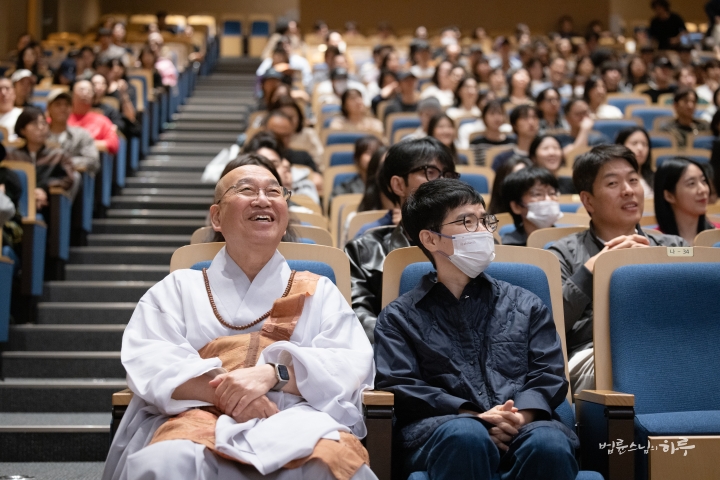
After Gilbeot’s Vice Representative Jeon Hye-jin gave her greetings, they watched a video of Sunim’s recent activities together. Images of Sunim’s recent survey trip to Myanmar, Thailand, and Cambodia unfolded on the screen.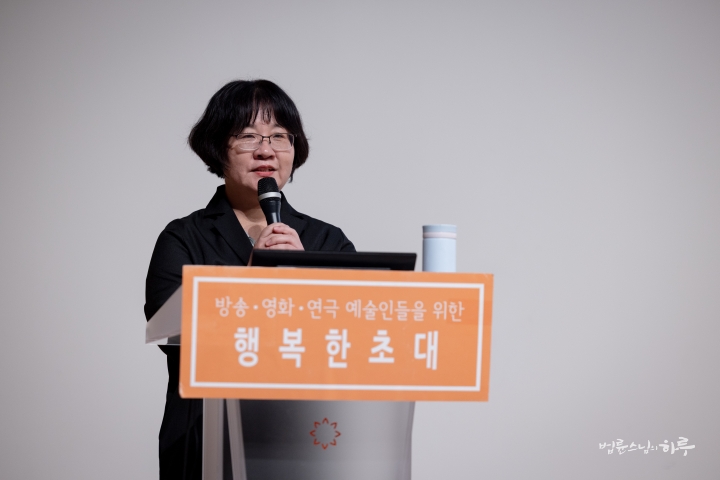
When the video ended, Sunim took the stage to applause. Sunim began the conversation by introducing the Southeast Asian survey trip along with JTS’s activities around the world.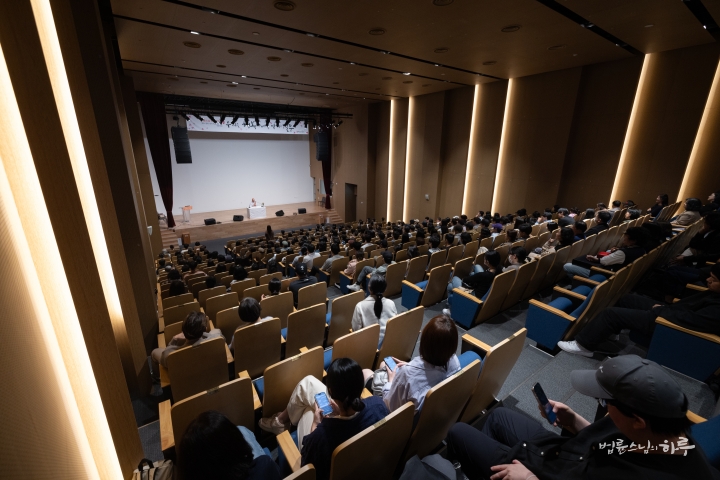
“After completing the Southeast Asian survey shown in the video, I moved to the eastern United States and conducted ten lectures over two weeks. When I visited Washington D.C., I exchanged opinions with U.S. Congress members, government officials, and think tank representatives on topics such as ‘How to facilitate dialogue between North Korea and the United States’ and ‘Is there a possibility of a surprise meeting between President Trump and Chairman Kim Jong-un when Trump visits Korea?'”
War Must Be Prevented for Any Reason
The risk of war on the Korean Peninsula has decreased significantly compared to last year, but looking at North Korea’s recent Party Foundation Day events, we can see that they still define inter-Korean relations as two hostile states and maintain confrontation. Last year, South Korea continuously provoked North Korea and heightened hostility, but this year, despite the change in government and attempts to improve relations with North Korea, North Korea’s closed heart is not easily opening.
Nevertheless, I continue to meet and dialogue with people from all walks of life with the conviction that ‘war must absolutely not happen.’ Currently, I am helping with post-war reconstruction work in Syria after the civil war. On top of the wounds from the civil war, earthquake damage has compounded the situation, leaving buildings throughout Syria almost completely destroyed. I am also supporting Myanmar refugees, as Myanmar continues to suffer from bombings due to military coups and civil war, with earthquake damage adding to the crisis, creating numerous refugees. 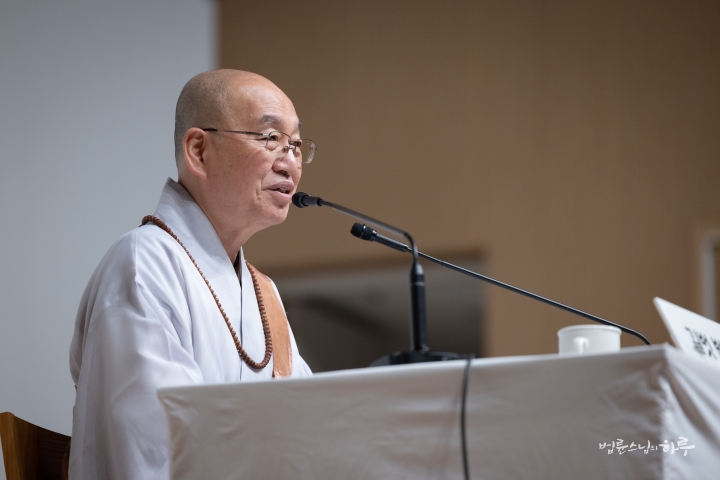
You might think that because I am a monk, I support temples, but that’s not actually the case. Since Myanmar and Thailand are Buddhist countries, to protect refugees, we have no choice but to operate shelters in the form of temples. While it’s difficult to simply say ‘we’re protecting refugee children,’ we protect boys by shaving their heads and making them monks, and girls become what are called ‘nuns,’ female practitioners. Shaving their heads and staying in ‘nunneries’ (residences for female practitioners) is more like an orphanage than a temple. So I went to see how we could help with the children’s accommodation, school education, and living support.
Refugees who cross the Myanmar border into Thailand are classified as illegal immigrants. However, since Thailand is a Buddhist country, no one can arrest someone wearing monastic robes. If a soldier who failed in a coup flees to a temple, shaves his head, takes precepts, and wears monastic robes, he cannot be arrested. He might be caught if he leaves the temple or takes off the robes, but while wearing the robes, he is protected. So boys can be protected this way, but since Thailand doesn’t recognize women’s ordination, there’s no way to protect girls. Myanmar has a nunnery system where girls can be protected by shaving their heads, but Thailand doesn’t have this system, creating significant practical difficulties. During this survey, we discussed how we could protect these girls.
What struck me most while touring these sites was the devastating impact of war. While collapsed buildings and lost livelihoods are tragic, the aftermath and difficulties of recovery from war are far greater. Our country also suffered such pain after the Korean War. In Syria’s case, not being able to return home due to lack of housing is a problem, but with schools and hospitals completely destroyed, the foundation of life has completely collapsed. Syrian people are said to have high educational enthusiasm like our country. But since schools aren’t operating, they say they can’t return home even if they want to. That’s why they urgently requested that we restore schools and hospitals first. 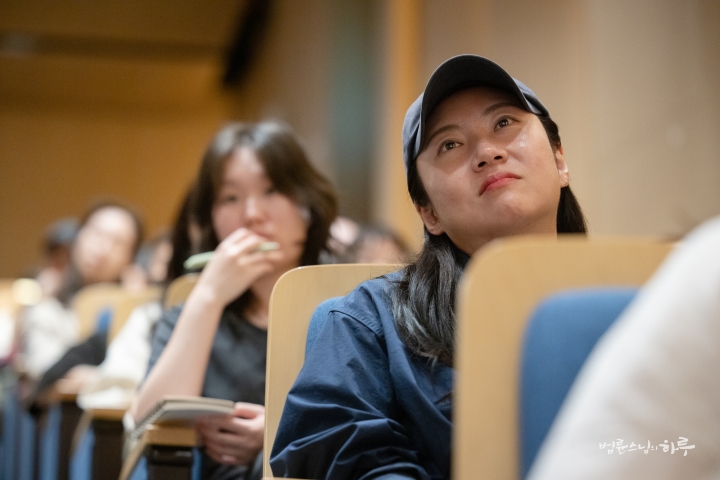
When we witness such realities firsthand, everyone feels an urgent conviction that ‘war must be prevented at all costs.’ Living in a society without war for a long time can sometimes lead to violent thinking like ‘let’s just go to war’ when conflicts escalate. Some dismiss efforts to avoid war as cowardice or criticize compromise as a sign of weakness. However, we must acknowledge our differences and achieve agreement and cooperation without resorting to violence. Despite this, the current international situation is increasingly heading toward confrontation of ‘strength against strength.’ Not only are there conflicts between nations, but political divisions within countries have intensified to the point of resembling civil wars.
Even in these circumstances, we must protect our own minds. We shouldn’t rationalize our suffering by saying ‘I can’t help it because of how my husband is’ or ‘I have no choice but to hate my wife because of how she acts.’ We cannot justify our suffering because the world is chaotic or because we have past wounds. We must be able to maintain peace of mind on our own regardless of the situation, and this is what practice is.
Furthermore, we shouldn’t stop at maintaining our own peace; we must become people who can alleviate the suffering of others in the world, even if just a little. In Sanskrit, such a person is called a ‘Bodhisattva.’ This has nothing to do with religion. Whether you believe in Buddhism, Christianity, or have no religion at all, while our beliefs may differ, we all must find peace of mind on our own and become people who can contribute, however modestly, to world peace. Only when we live this way can we truly preserve our dignity as human beings.” 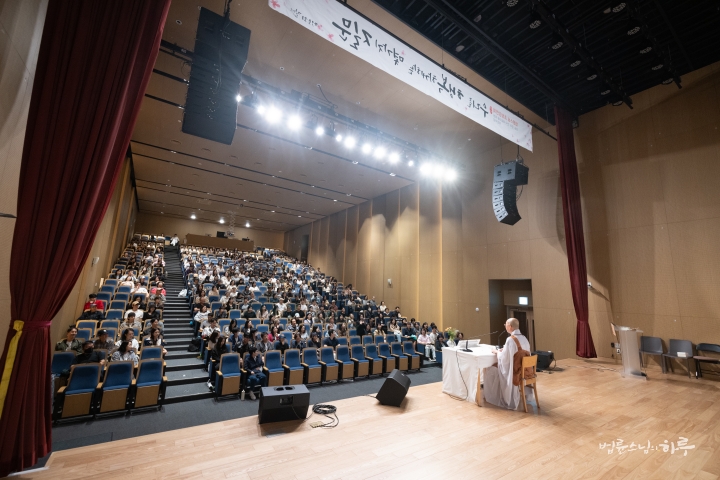
Nine people then raised their hands and had conversations with Sunim. Those who had submitted questions in advance asked first, followed by spontaneous questions from the audience. One of them, as a head writer, sought Sunim’s advice on how to work happily and manage relationships well while feeling exhausted from responsibilities and numerous relationships.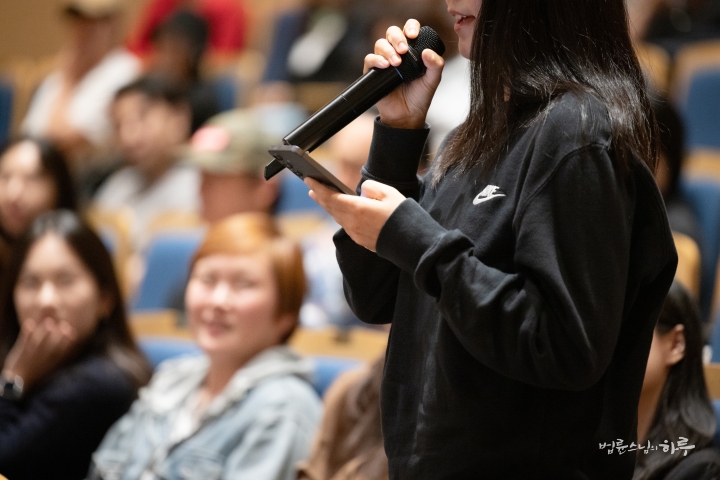
After Becoming a Head Writer, the Weight of Responsibility and Relationships Is Overwhelming
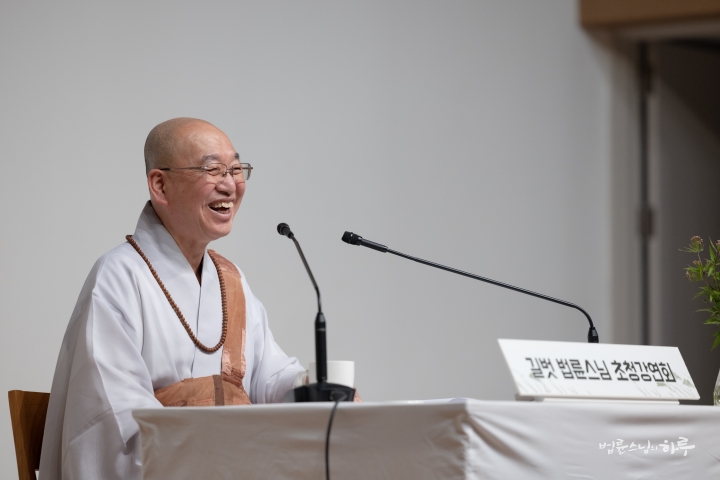
“First, if it’s too hard, you don’t have to do it. There’s no problem at all if you don’t do it. Even if you don’t do that job, tomorrow’s TV broadcast will air as usual. Even if you don’t meet your boyfriend, he’ll have another girlfriend in a few days. Even if you don’t write, another writer will be writing soon enough. Even if you don’t work as a head writer, someone else will be in that position working in a few days. That’s why it’s okay not to do that job. You might ask, ‘How will I make a living?’ but you’ll manage to eat. Whether you get free meals or buy your own, you’ll eat somehow. There’s no problem making a living doing something else. So if it’s hard, don’t do it. That’s the first option.
To be honest, I also have it very hard. I have to wake up at 4 A.M., my legs hurt when I do 108 prostrations, my throat hurts when I chant, my back hurts when I meditate, others eat meat but I can’t, I can’t date – the hardships are endless. If I complained to you like this, what would you say to me? You’d probably say, ‘If it’s that hard, why don’t you just stop being a monk?’ Then I’d have something to say too: ‘I’ve only been a monk for 50 years, how can I do anything else?’ But even if I left the monastic life, I wouldn’t have much trouble making a living. Now that I’m over seventy, I’d get a senior pension, so I could at least afford instant noodles. And even without any assets, these days I’d be classified as vulnerable and could get a government-subsidized rental apartment if I wait a bit. That way, I could live without starving. So you too would have no problem not doing that job. If a squirrel came to me and said, ‘Sunim, life is so hard these days. The trees have grown so tall that the nuts are too high to reach,’ or ‘People keep collecting acorns and chestnuts, so there’s nothing left to eat,’ what would I say? But no squirrel says such things, and no rabbit says such things. So first, there’s no problem if you don’t do that job. 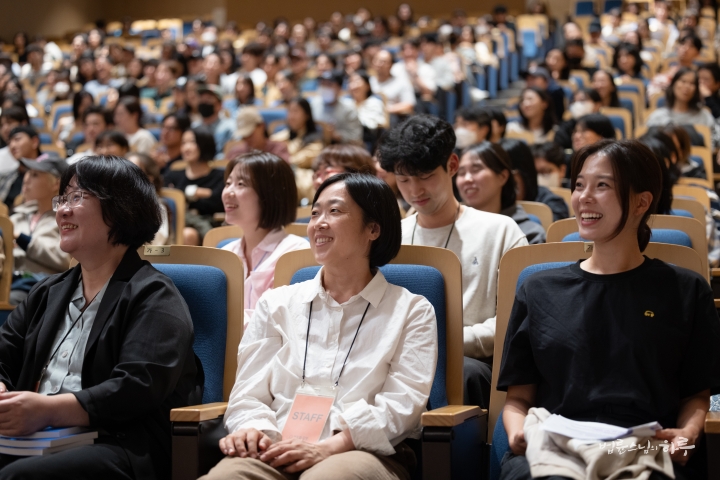
Second, it’s a good thing that you’ve become a main writer. If it’s still difficult, you can always go back to how things were before. For example, imagine a presidential candidate who lost the election comes to me complaining about how hard it is. But from a different perspective, just becoming a presidential candidate is already a success in their political career. Being selected as a candidate alone is a success. Just because they didn’t win in the end doesn’t mean they failed politically. Similarly, becoming a writer is already a success, and becoming a main writer is even more of a success. If it’s still difficult despite this success, you can simply give up the main writer position. If someone wins the lottery but finds it too hard to spend the money, they can just give it back. Like this, if you think about it just a little, there’s really no problem.
Third, you just listed more than ten difficulties, but are they really that difficult? Let’s say a woman gets married and raises a child. Imagine she’s holding the baby while her husband and mother-in-law are nearby having a conversation. When this woman relates to the baby, she becomes a mother; when she talks to her husband, she becomes a wife; when she talks to her mother-in-law, she becomes a daughter-in-law. So she’s playing three roles. Is that difficult?”
“Yes, it’s difficult.”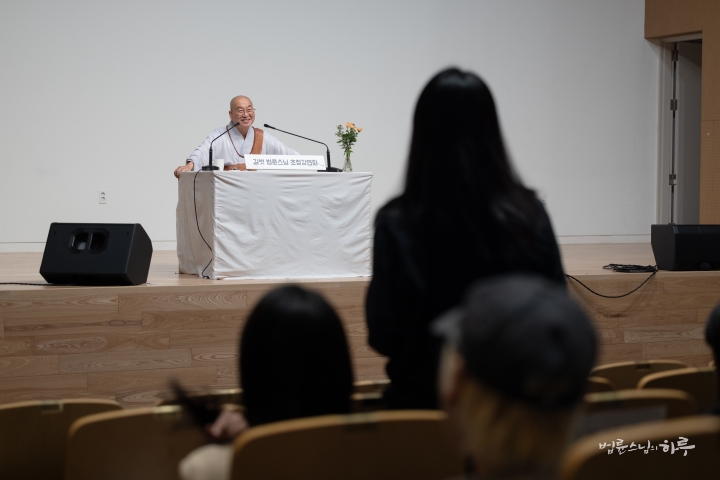
“Then you’d better leave this world quickly. When we get in a car, we become passengers; when we go to a store, we become customers; when we go to school, we become parents. Isn’t that our life? If you think about it, we’re not just playing three roles. We’re playing a hundred roles while living. To list them all one by one saying ‘I have to be a parent, I have to be a customer,’ and so on is not appropriate. Do you set out ten side dishes and complain, ‘Do I have to eat all of these evenly?’ You’re saying, ‘I have to eat kimchi, I have to eat soup, I have to eat tofu, I have to eat fish stew, how can I eat all of this?’ You don’t have to eat everything, and you can just eat this and that.
Living itself means playing multiple roles. When you become a writer, you have to write; when you become a main writer, you have to manage junior writers. And when you submit your work to the production company, you’ll receive revision requests. Here they’ll ask you to write this kind of work, there they’ll ask you to write that kind of work. Naturally, various demands will arise. To increase ratings, it needs to be both entertaining and beneficial, so they’re bound to make various demands. Taking those demands and cooking them up is the role of a main writer. Cooks also receive various demands. It should smell good, taste good, and look good. When you cook and serve food, some people will say, ‘It tastes good but doesn’t look great,’ while others will say, ‘It looks and smells good but doesn’t taste good,’ and so on. People who value taste will evaluate by taste, people who value aroma will evaluate by aroma, each person will evaluate according to their own standards. But the problem is that you’re trying to satisfy everyone’s preferences.”
“Yes, but broadcasting itself requires accepting and fulfilling all those demands.”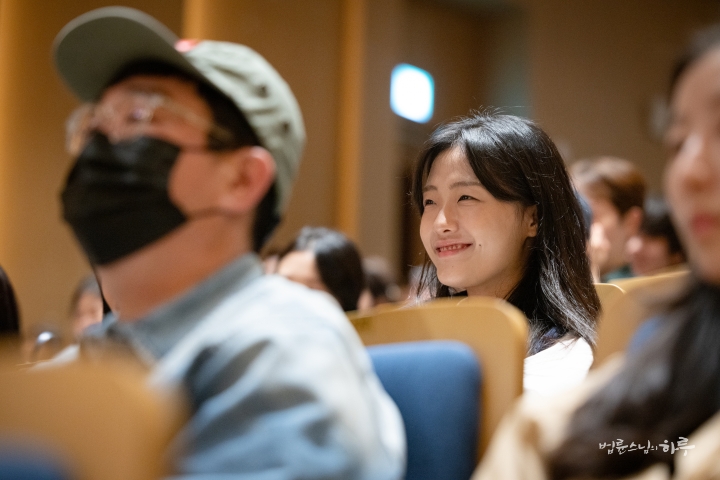
“Why do you have to fulfill everything? No matter how hard you try, some things will be fulfilled and others won’t. In fact, nothing can be fulfilled one hundred percent. To you all, it might seem like I fulfill everything while living. But if a woman comes to me and says, ‘Sunim, I love you so much. Please marry me,’ can I fulfill that request? Then she might say to me, ‘How can you talk about saving all sentient beings when you can’t even properly love one person?’ Does that make me someone with a big problem? No, it doesn’t. So the reason for this anguish is all due to greed. It’s not the problem of the people making demands.
You listed only about ten roles that are demanded of you, but I have over a hundred demanded roles. I accept all those demands and cook with them. I say ‘Tell me everything you want’ and accept it, then cook as much as I can and serve it. Then some people will say I did well, and others will say I didn’t. That’s just their evaluation.”
“I want to accept people’s demands well, but in reality, I don’t seem to be accepting them well.”
“Not being able to accept them is your own problem.”
“Yes, it’s my problem.”
“At such times, you need to realize, ‘I’m being greedy.’ First, not everything I want can be achieved in this world. Yet we have the illusion that everything can be achieved. Second, I can’t fulfill everything people demand of me. Yet I have the illusion that I can do everything for them. If I could do everything people want, I would be an omnipotent God. But even an omnipotent God can’t do everything we want. So how could you possibly fulfill everything people in this world demand? That’s tremendous arrogance. There’s a limit to delusion. Especially when you don’t even have much ability. (Laughter) 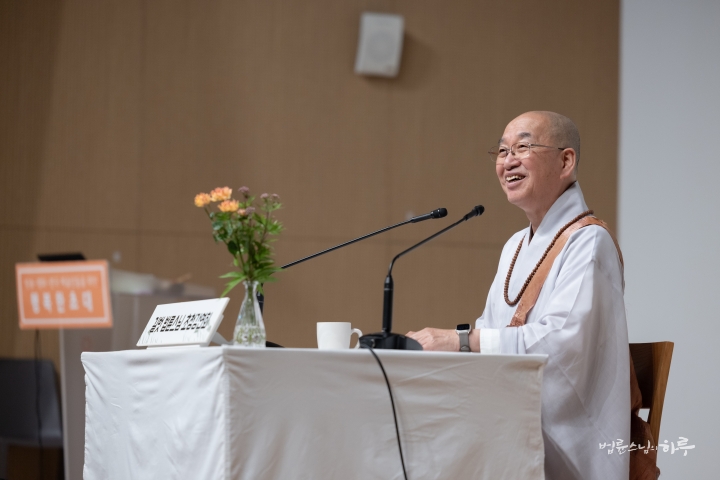
So you need to face yourself honestly. When people make various demands, you can answer like this:
‘Thank you for valuing my abilities highly and making these requests. Okay, I’ll give it a try.’
Then you present it saying ‘This is my work,’ and that’s it. If they evaluate it negatively, say ‘Okay, I understand,’ and if they evaluate it positively, say ‘Okay, I understand.’ Then if you get fired from being a main writer, you can go back to being the junior writer you liked. What’s there to worry about? The cause of worry is your arrogance. First, it can be called greed, and second, it can be called arrogance. You’re under the illusion that you can do everything.”
“Sunim, then when the company says, ‘We asked you to make it this way, why is it only this good?’ can I say that this is my best?”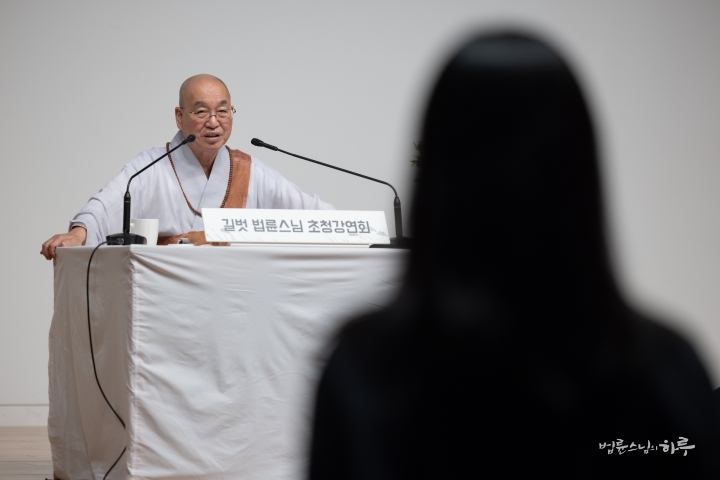
“If you answer like that, the other person will feel bad. Because you’re not acknowledging your mistakes. In this situation, you should say, ‘I’m sorry. I tried my best, but this is all I could do.’ It’s not something to feel bad about when that person makes excessive demands on me. They think highly of me. The reason is that you oversold yourself. Since you oversold yourself, that person is making demands accordingly. If you’re not actually at that level, you need to face that fact.
If you oversell yourself too much, it’s advantageous for being selected, but living your whole life becomes burdensome. For example, if I treat a man well and succeed in marriage, I’ll suffer for life. Since the man married me seeing how well I treated him, he’ll expect me to treat him well for life. It’s possible to treat someone well temporarily, but how can you treat them well for a lifetime? Then the partner will complain that they misjudged the person. What’s needed for being selected and what’s needed for living are different. So actually, to live comfortably for life, it’s better not to be too kind to people. It’s better not to show your talents too much either. Then there might be some difficulty in being selected initially, but after being selected, the relationship improves. Because they’ll evaluate you as ‘I didn’t expect much, but working together, you’re pretty good.’
When you see someone who becomes popular overnight, you’re envious, right? But the person themselves is dying inside. It looks good to others, but the person is under tremendous stress to maintain that popularity. If someone who can’t study well gets into Seoul National University by luck, they’ll be last in their department for all four years. They’ll only feel good on the day of admission, and live with an inferiority complex for four years. But what if someone with the ability to go to Seoul National University goes to a lower-ranked university? They’ll feel bad on the day of admission, but they can relax and still be first for four years.
This is life. There can be lives that look good to others, but actually everything is equal. In reality, it’s just the difference between eating a lot now and starving later, or eating a little and saving to continue eating later. The fact that people have many demands of you means they have high expectations of you. Isn’t having high expectations something to be grateful for?”
“Yes. It’s something to be grateful for.”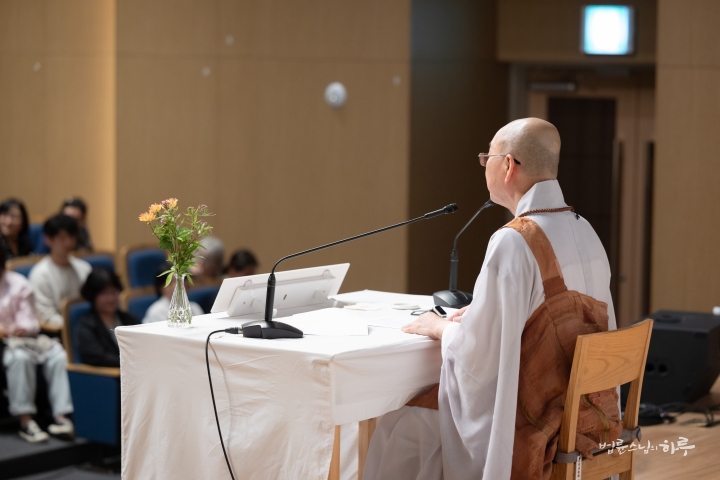
“Since it’s something to be grateful for, there’s no need to feel bad about it. First, say ‘Thank you for thinking highly of me,’ and second, say ‘I’m sorry.’ If you just keep these two phrases on your lips – ‘Thank you’ and ‘I’m sorry’ – you’ll be fine. ‘Thank you for thinking highly of me. I’m sorry I couldn’t meet your expectations.’ If you live with a smile saying this, there won’t be any problems. Do you think you can’t even do that?”
“I think I can do it. Thank you. Before the lecture started, you talked about Syrian refugees and the Myanmar earthquake, so I hesitated a bit thinking, ‘Should I ask this question? Isn’t this a privileged complaint?’ But after listening to your words, I was able to think once again about the gratitude I had forgotten.”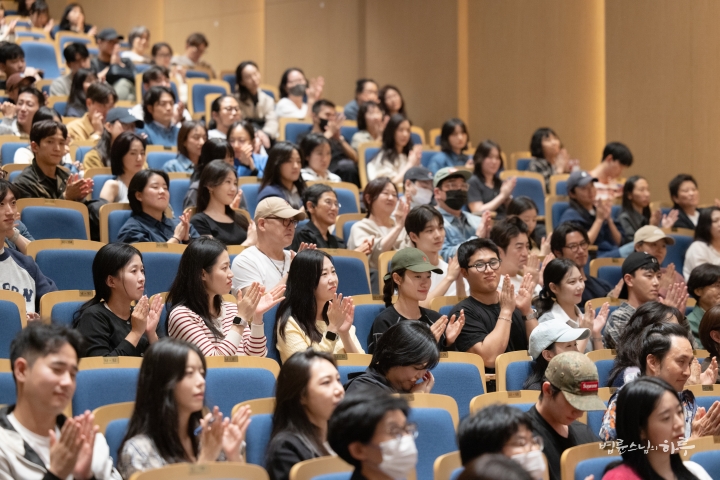
Questions continued one after another. Today, people working in various fields such as actors, managers, writers, directors, and entertainment industry professionals shared their various concerns.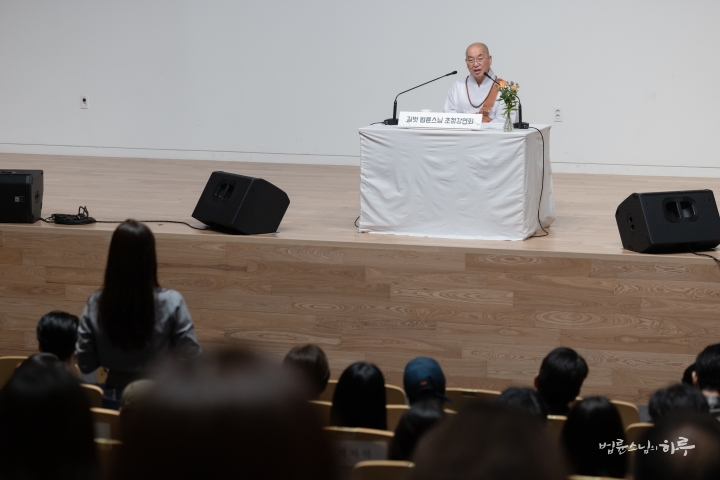
As they conversed, two hours passed quickly. The participants’ hearts also became bright and light. Sunim offered words of encouragement for the broadcasting, drama, and film industry professionals who attended.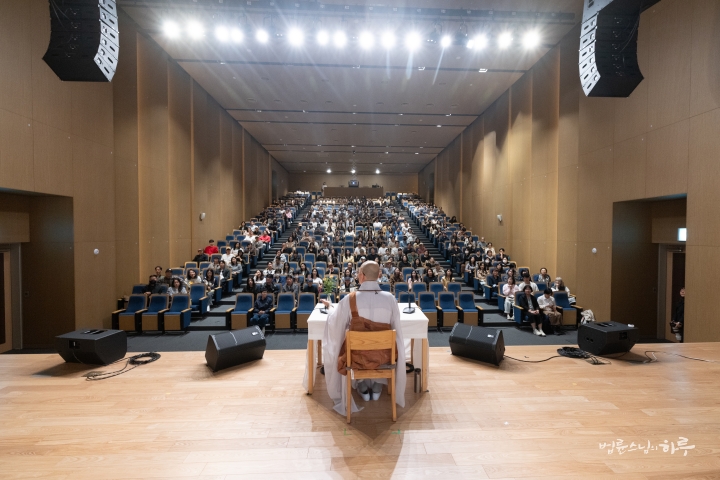
“Since I didn’t attend university, I have no need to falsify my educational background, and since I don’t have a doctoral degree, I won’t get caught up in plagiarism controversies. There’s little chance of getting into trouble. But you don’t know how comfortable this is. Educational credentials might be good temporarily, but eventually those credentials become a prison that confines you.
For example, if you wear a mink coat, you can’t just sit down anywhere when your legs hurt while walking. If you drive a Mercedes-Benz, you’d be reluctant to park in front of a street food stall to eat tteokbokki. There’s a ‘dignity maintenance cost.’ But what if you wear comfortable clothes? You can sit anywhere when your legs hurt, and eat wherever you want whenever you want. Why confine yourself in appearances and formalities to live in a prison when you can be this free? 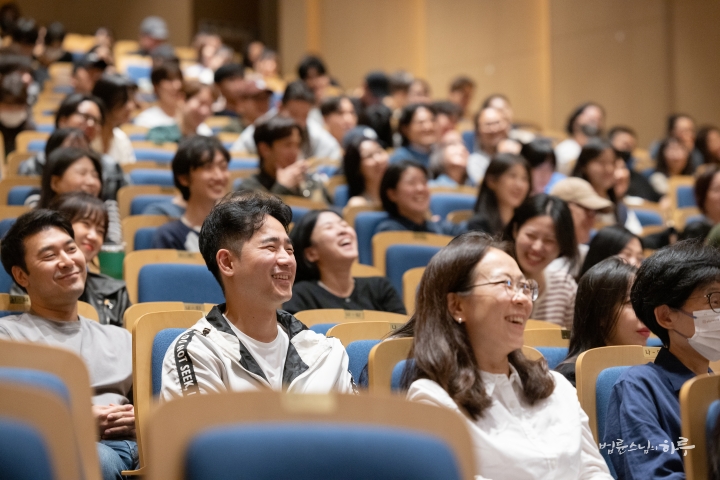
How to Live Freely Without Being Obsessed with Popularity
Today, many actors have come to this gathering. The more famous you become, the more a sense of superiority grows in one corner of your heart, but at the same time, you live being overly conscious of the world’s gaze. Rabbits, deer, and all wild animals live freely according to their own will – so why must we, born as humans, live constantly watching what others think? When you can let go of such thoughts completely, only then does true freedom arrive. In my view, it’s truly regrettable to sell yourself to the world’s empty fame and status. Living that way means you must always live in a state of anxiety, watching others’ reactions and hiding. Of course, I don’t mean you should be rude to others. You must maintain proper etiquette, but you shouldn’t be too bound by it. ‘I’ll do my best, and while it would be nice to gain popularity, it’s okay if I don’t.’ When you hold this mindset, you become much freer. 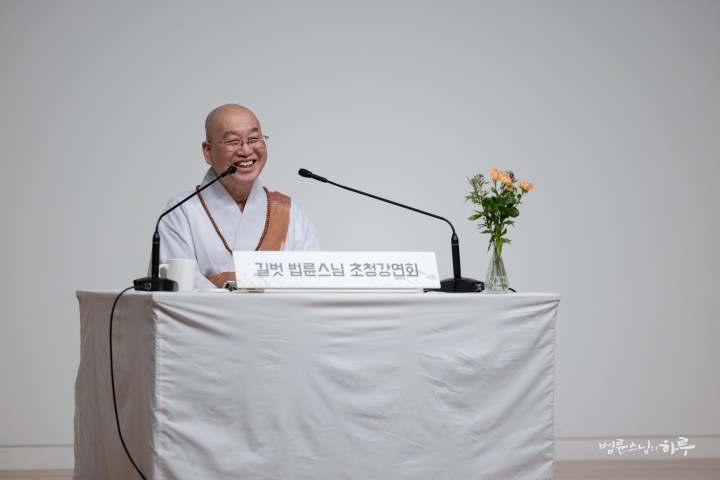
What I find most regrettable are the cases of idol singers and actors who gained popularity from a young age. When you enjoy popularity at a young age, it’s easy to fall into a sense of superiority thinking you’re special and to treat others carelessly. On the other hand, you must live in constant anxiety and urgency trying to maintain that popularity. That’s why many fall into drug addiction or various other addictions when their popularity declines. Growing gradually is much better than gaining rapid popularity. Popularity in youth often comes more from appearance than acting skill. That’s not so much your own ability as it is the grace of your ancestors. So rather, becoming an actor who is loved even as you age – through your forties and fifties, and even when you become a grandfather – that is the true path of an actor. When that happens, acting can become a lifelong profession.
A life of steady acting and consistently creating works is the most beautiful. When you receive attention while young, you must live under the pressure of maintaining those expectations for your entire life. While you may appear to be a famous writer or actor on the outside, inside you constantly feel burden and anxiety. So there’s no need to be discouraged if you’re not popular right now. It means you still have room for growth and possibilities.
I don’t evaluate you by your status or popularity. I see ‘you as human beings.’ I hope you will value your own life most preciously. I’m not saying don’t pursue popularity, but I want to tell you that when you become too obsessed with it, your heart can become sick and life can become difficult.” 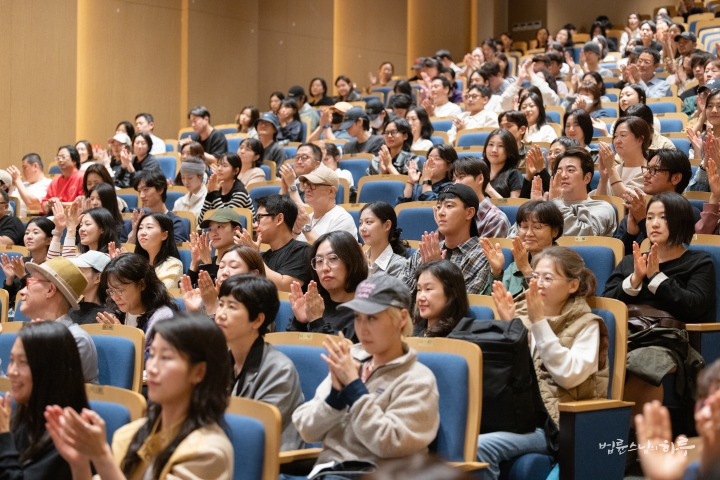
The lecture concluded with thunderous applause. Through a lottery, several participants received books with Sunim’s handwritten signature as gifts. As each person’s name was called, everyone cheered enthusiastically as they came forward to receive their gift.
Jung Eun-hye, who appeared in the drama ‘Our Blues,’ also received a book with Sunim’s handwritten signature as a gift.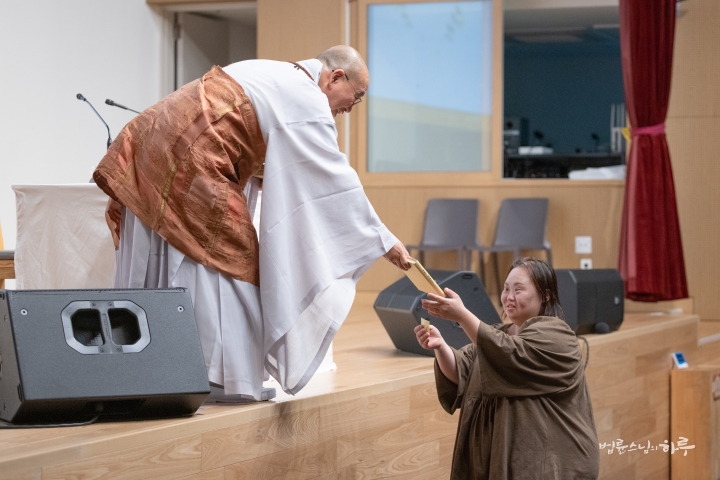
Sunim and writer Noh Hee-kyung stood at the front of the stage and shook hands with each participant as they left the venue, expressing their gratitude.
“Thank you for coming. Be happy!” 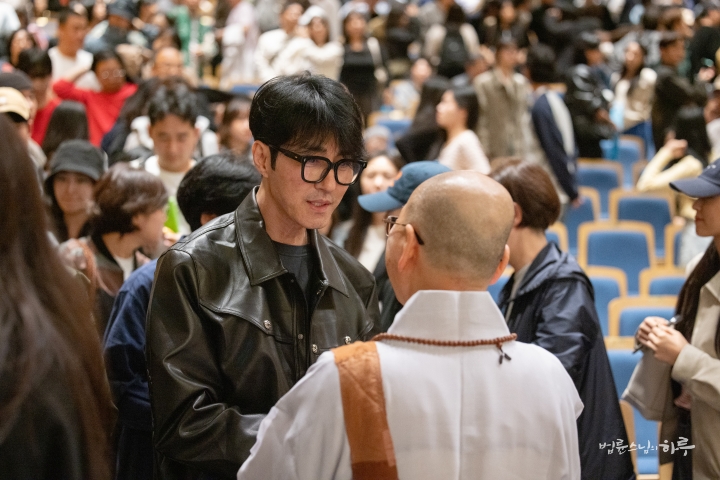
After all participants had left, only the volunteers who had prepared the lecture gathered to take a commemorative photo with Sunim.
“Gilbeot, fighting!”
With this, the thirty-fifth Gilbeot lecture series came to a close.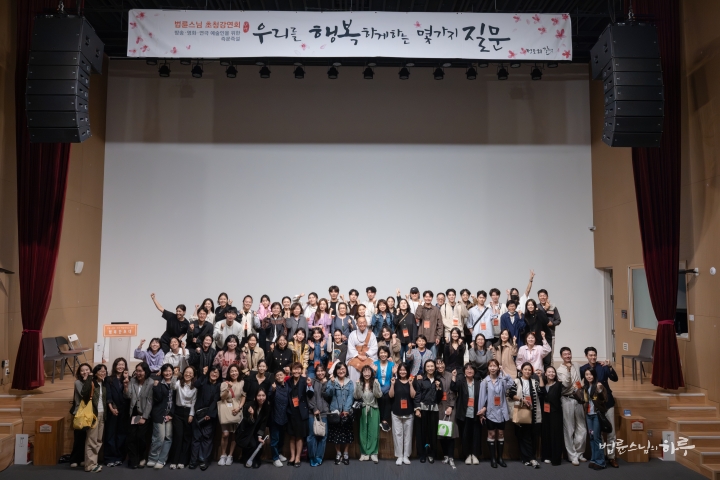
Tomorrow morning, Sunim will meet with a social figure visiting The Peace Foundation, and in the afternoon, he will have a regular hospital checkup.





